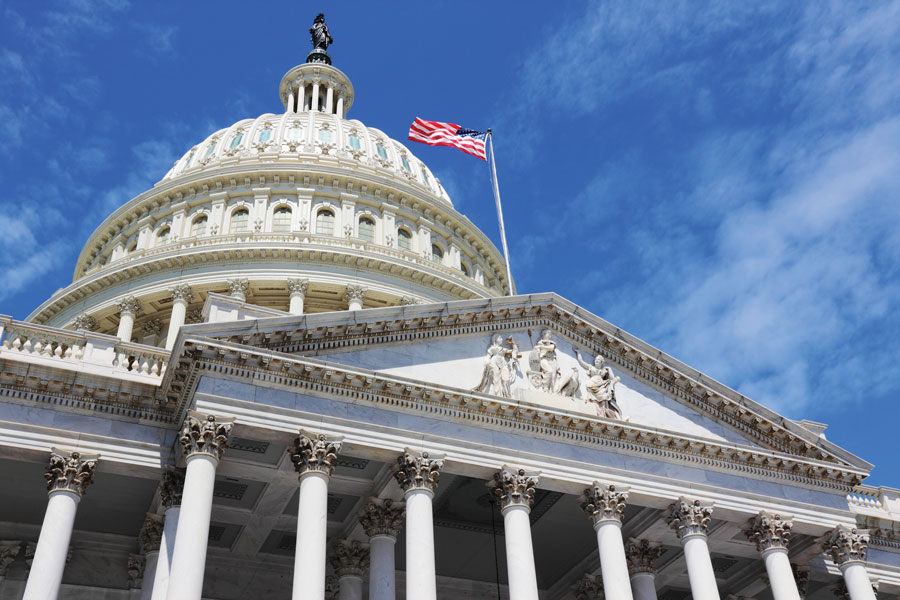

House Republicans are putting up strong resistance to the SEC’s request for a bigger budget in part because of concerns about the agency’s climate disclosure proposals.
GOP members of a House panel that sets the Securities and Exchange Commission’s budget grilled Chairman Gary Gensler Wednesday about whether the regulator has the power to mandate greenhouse gas disclosures by public companies.
“We have seen you sprint outside your congressional jurisdiction,” Rep. Kim Hinson, R-Iowa, said at a hearing of the House Appropriations Subcommittee on Financial Services and General Government. “It’s time to reel it in.”
Hinson cited several parts of securities law to reinforce her point. “I went through all of these sections, and nowhere does it say climate, emissions or greenhouse gas,” she said.
Gensler defended the proposal, arguing that hundreds of companies are already making climate disclosures and that many investors want to know how climate change will affect a company’s finances and operations before making decisions on whether to buy stock. He stressed that the SEC isn't trying to promote investing based on environmental, social and governance factors.
“We are merit-neutral,” Gensler told lawmakers. “We’re trying to bring consistency and comparability to those disclosures.”
Gensler was on Capitol Hill to support the Biden administration’s request for a $2.4 billion SEC budget in fiscal year 2024. That represents a $265 million increase from the agency's current budget and would allow it to hire an additional 170 staffers, following an increase of 400 in fiscal 2023. The fiscal 2024 budget would support 5,139 SEC full-time equivalents.
But Rep. Michael Cloud, R-Texas, asserted that that funding would be misallocated if it supports agency work on climate issues. He pointed out that Congress failed in a previous session to approve a bill that would have codified public company disclosures.
“It is not law, and there is no authority to collect this information,” Cloud said. “You’re asking for more employees to do your job. But it seems that some are tasked to doing something you do not have the authority to do.”
Gensler was given a chance to respond by Rep. Sanford Bishop Jr., D-Ga., who asked Gensler whether climate-risk data would be valuable for investors.
“Thousands of investors wrote in and said we currently use this information. We would benefit to ensure that it’s at least consistent and not misleading,” Gensler said. “That helps capital formation. That helps investors. And it helps whether you’re pro-green or you want to invest” elsewhere.
Gensler asserted that the SEC requires a bigger budget in order to better police burgeoning financial markets. He noted that the clients of registered investment advisors grew from 34 million in 2017 to 53 million in 2022, an increase of 60%. The number of RIAs is about 15,000, up from 12,500 in 2017. The average daily trading volume in equity markets rose from 30 million to 77 million over the same time frame.
“Such growth and rapid change also means more possibility for wrongdoing,” Gensler said in prepared testimony. “As the cop on the beat, we must be able to meet the match of bad actors. Thus, it makes sense for the SEC to grow along with the expansion and increased complexity in the capital markets.”
The GOP-controlled House isn't likely to give the SEC all the money it’s seeking.
“The sheer size of our government is too large,” said Rep. Steve Womack, R-Ark. and chair of the House Appropriations subcommittee. “The SEC’s budget is a prime example.”
It’s unclear how the SEC budget request will fare in the Democratic Senate or how a compromise might be reached.

Relationships are key to our business but advisors are often slow to engage in specific activities designed to foster them.

Whichever path you go down, act now while you're still in control.

Pro-bitcoin professionals, however, say the cryptocurrency has ushered in change.

“LPL has evolved significantly over the last decade and still wants to scale up,” says one industry executive.

Survey findings from the Nationwide Retirement Institute offers pearls of planning wisdom from 60- to 65-year-olds, as well as insights into concerns.
Streamline your outreach with Aidentified's AI-driven solutions
This season’s market volatility: Positioning for rate relief, income growth and the AI rebound
